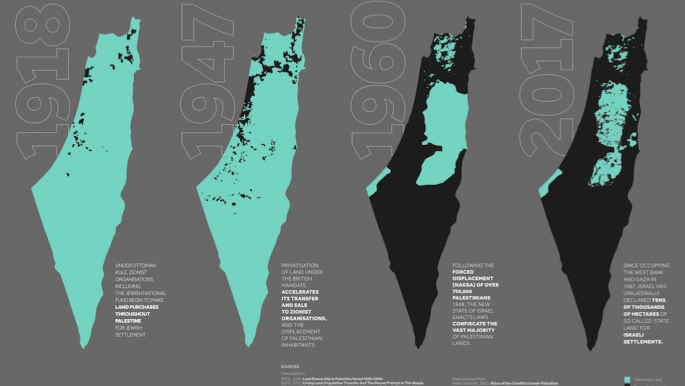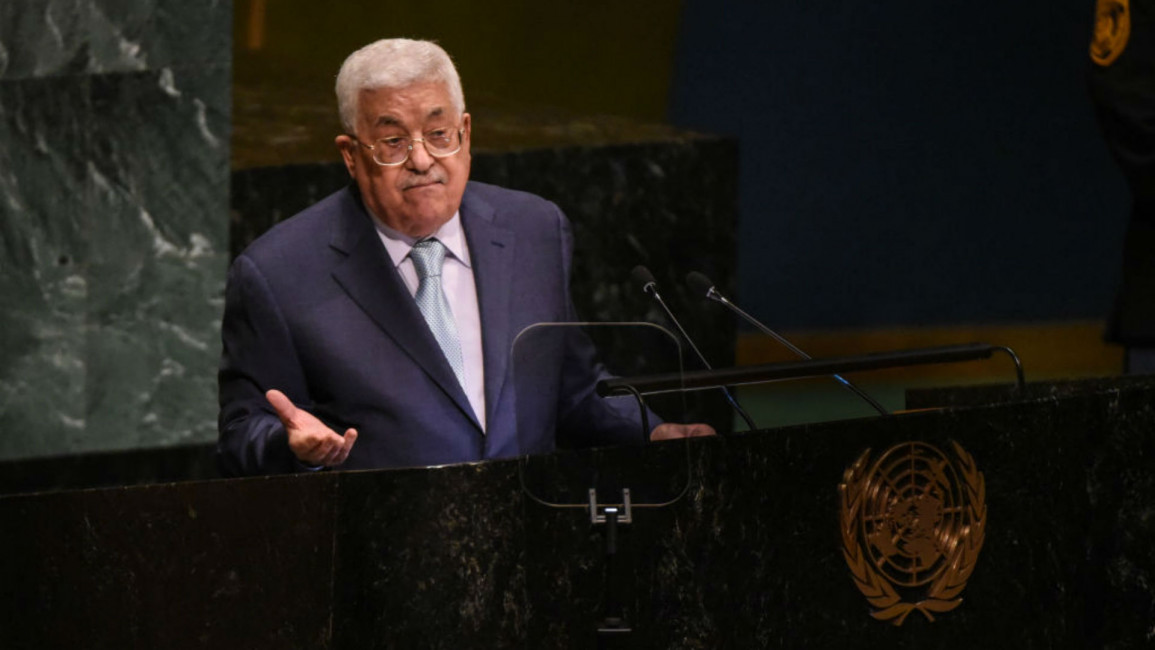
Promoting Abbas at the expense of Palestine
In a bid to re-establish its leadership among Palestinians, the Palestinian education ministry recently launched a booklet entitled, "Our role model, our President".
A collection of reflections by PA leader Mahmoud Abbas, the booklet was to be distributed in Palestinian schools. The plan backfired, however, when Palestinians rejected the attempt to strengthen their national identity with what came off as patronising paternalism.
Some tweets on social media have likened the PA publication to former Libyan leader Muammar Gaddafi's Green Book. Palestinian academics and intellectuals have signed a petition calling for it to be withdrawn from the curriculum, emphasising that students should be taught the "values of liberty, equality and critical thinking."
However, Palestine's unique circumstances due to Israel's ongoing colonisation, merit specific attention. It's also imperative to draw attention to the PA's systematic degrading of Palestinian history and rights, as part of its conforming to external impositions on Palestine.
The PA's lack of foundations at a grassroots level perhaps explains its attempt to impose on the education system Abbas' vision of how to acquiesce to Israel.
The Palestinian education curriculum is already besieged with Israeli and international demands over how Palestine is depicted and taught. Last week, the EU announced it would be conducting an academic study to determine if Palestinian textbooks contain "possible incitement to hatred and violence".
For Abbas and his brand of compromised politics, there is no dissonance between Palestinian national identity and losing Palestine.
 |
National identity is a collective process of historical, political and social contributions. |  |
This minority viewpoint, rendered mainstream only because it suits international interests and the two-state diplomacy which is fast depleting Palestine, is not a reflection of the Palestinian population and their collective memory.
The booklet was apparently prepared by high school students who studied Abbas' speeches, but it's worth noting that this was only explained once the backlash had ensued, with may articulating harsh criticism regarding the aims and content of the publication.
The selection of Abbas' quotes chosen for the booklet reportedly include him forfeiting of his right of return, his distorted idea of what constitutes Palestine, as well as the lauding of security coordination with Israel as "sacred".
PLO Secretary General Saeb Erekat criticised the Palestinian people's rejection of the booklet, stating, "I ask all those who consider that the efforts made by 10th and 11th graders at Al-Bireh Girls School to issue a booklet deserved mockery, that they read it before condemning it."
 |
|
Why, though, would the Palestinian education ministry go out of its way to launch a booklet exalting Mahmoud Abbas, if there was no intention to endorse its content across the education system?
Erekat seems to have conveniently forgotten that Palestinians have been coerced into living with Abbas' statements and policies since the PA's inception. In the occupied West Bank, Palestinians have been targeted and exploited by the PA's security services for Israel's benefit.
Palestinians in Gaza, on the other hand, have had their resistance ridiculed and sanctions imposed on the enclave to force a change in political leadership and the re-establishment of Abbas' rule.
 |
The Palestinian education curriculum is already besieged with Israeli and international demands over how Palestine is depicted and taught |  |
All Palestinians - including those in the diaspora - have had to live with the knowledge that Abbas trivialised the Palestinian right of return in diplomatic negotiations that have only served to strengthen Israel's colonial expansion.
Contrary to what Erekat says, Palestinians are not just rejecting a booklet, they are saying no to his history of political blunders.
Abbas is merely a representative of the PA; an organisation that was forced upon the Palestinians by the international community, and which became a fixed "interim" in Palestinian politics.
The PA knows that its existence does not guarantee a state for Palestinians, let alone liberation from colonialism.
The international community - supportive of Abbas and not of Palestinians - is also aware of the diplomacy that has used Palestinians for political motives.
For the PA to expect the Palestinian education system to endorse this political deception is a step too far. How many schools have the PA and the international community sought to protect from demolitions? How much concern has either body shown for the destruction of education infrastructure in Gaza?
Read more: The UN is failing Palestine's schoolchildren
The absence of any attempt to protect premises is also telling of the efforts to exploit education to alter the curriculum in a manner that swaps legitimate Palestinian demands and aspirations for a collection of statements that jeopardise not only Palestinian history, but also its already precarious future.
National identity is a collective process of historical, political and social contributions.
When Palestinians speak of Palestine, they are not visualising the PA. It is the roots of their history that form the premise of their identity.
The Nakba, which for the PA appears to have little significance beyond an annual day of commemoration, forms the foundations of Palestinian collective memory. It is from Nakba memory and its ongoing trauma that Palestinians speak of historic Palestine; the time before Israel came into existence as a European colonial project.
It was the international community that imagined and implemented a political structure comprised of Palestinians who would gradually dilute the Palestinian anti-colonial struggle.
 |
The Nakba forms the foundations of Palestinian collective memory |  |
The PA and the international community speak of Palestine in terms of a two-state paradigm which fails to eliminate colonialism, and which is in direct confrontation with Palestinian aspirations and the foundations of their education, now also targeted by the PA.
In trying to impose the booklet upon the Palestinian education system, the PA is forcing educators to accept and normalise international interpretations about Palestine.
The people, however, are not in need of Abbas or any other political entity to justify their demands which are rooted in their history and memory. They have no need for innovative and dangerous interpretations of what Palestine is, or how its future should be determined.
Abbas has left the future of Palestine in the hands of the international community, which determined - when recognising Israel - that it would formally accept a colonial project masquerading as a state.
Unlike the Palestinians, but in line with what the international community started, Abbas' vision of Palestine is one where there is no Palestine at all.
Ramona Wadi is an independent researcher, freelance journalist, book reviewer and blogger specialising in the struggle for memory in Chile and Palestine, colonial violence and the manipulation of international law.
Follow her on Twitter: @walzerscent
Opinions expressed in this article remain those of the author and do not necessarily represent those of The New Arab, its editorial board or staff.




